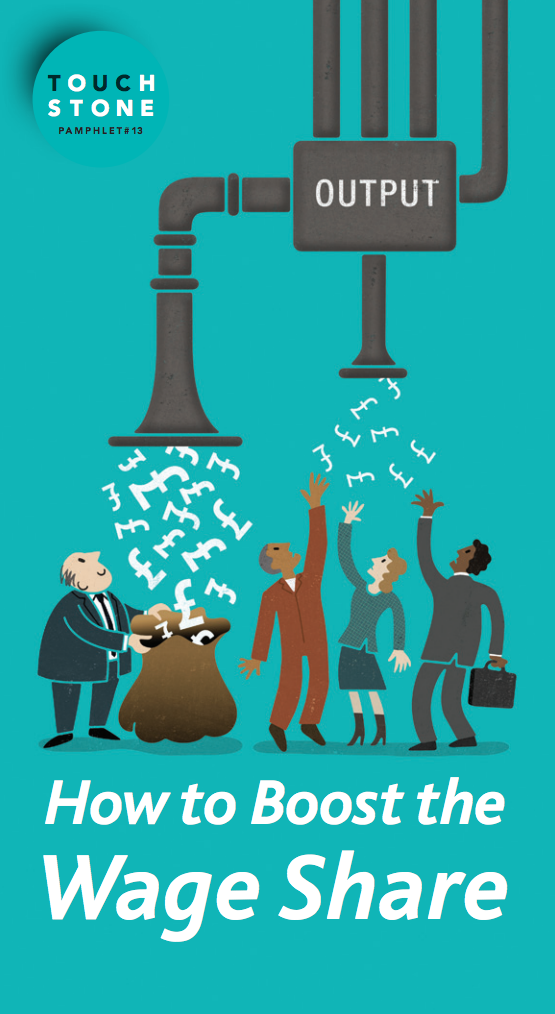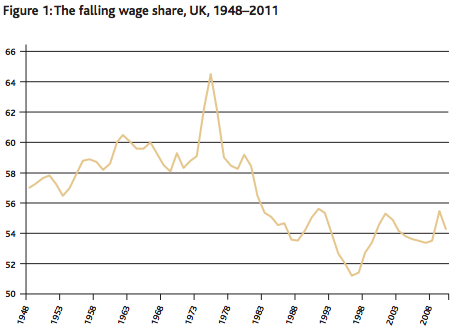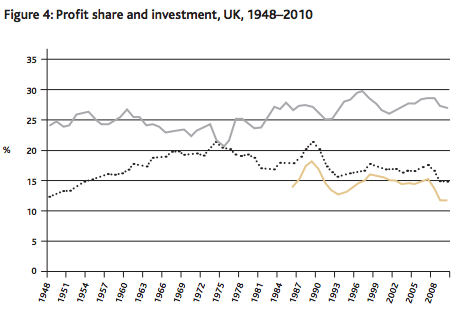The TUC has published a new Touchstone pamphlet by my good friends and colleagues Howard Reed and Stewart Lansley:
As Christine Lagarde, Head of the IMF said in January this year:
I believe that the economics profession and the policy community have downplayed inequality for too long … Now all of us have a better understanding that a more equal distribution of income allows for more economic stability, more sustained economic growth, and healthier societies.
She is right. The share of wages in the overall income of our country has fallen for more than thirty years (this diagram comes from the pamphlet):
The result is a lack of purchasing power for ordinary people, growing inequality and a profound sense of social injustice. As a result Howard and Stewart argue that:
Increasing the wage share is one of the key economic policy challenges for the next decade. A rising wage share will underpin higher living standards and allow growth that is more sustainable and not reliant on consumer debt. This study looks at what practical steps policy makers could take from raising the minimum wage through to an active industrial policy in order to boost wages.
That is what we need. We do not need more profits for business to stash unproductively in tax havens and to leave unused when real investment in the economy is needed, as this diagram shows:
We need people who have the money they need to live lives of dignity.
I argued on air yesterday when discussing MP's pay that people joining unions and demanding fair pay for themselves, just as MPs were doing, was part of the solution to this problem, and I am convinced it is. Having any major political party that took the needs of working people seriously would also help but it goes beyond that. As Howard and Stewart also argue:
Rebalancing the economy towards a higher overall and ‘lower half wage share', a reduced dependence on low pay and a smaller pay gap would lead to stronger growth and less economic turbulence. While stemming and reversing the trends of the last 30 years will be far from easy, and will have to be secured gradually over time, the evidence is that doing so is a necessary step for achieving sustained economic health.
Achieving this rebalancing requires, above all, a new social contract with labour, or what President Obama has called a new ‘basic bargain' — one underpinned by a new set of governing rules between the state, the workforce and business. In the UK, the current contract has broken down. Growth no longer automatically delivers improved living standards, while a large and growing proportion of the workforce is being denied secure work and decent pay.
The elements of this new social contract should be:
— measures aimed at raising the earnings floor for those currently in work
— measures aimed at capping excessive rewards at the top
— measures aimed at increasing the extent of collective bargaining and workplace participation
— a new central commitment to policies that create full employment
— longer term measures aimed at reversing the recent trends towards a low pay economy.
Rebalancing the economy in this way requires a mix of short-, medium- and longer-term measures. These would aim first to raise wages in the bottom half of the distribution and narrow the pay gap among the existing workforce. A second group of longer term and more fundamental measures would then aim to alter the structure of the workforce by reducing the economy's dependence on low paid sectors.
This is precisely the sort of thinking we need form the TUC right now. It is what Labour needs to hear.
Thanks for reading this post.
You can share this post on social media of your choice by clicking these icons:
You can subscribe to this blog's daily email here.
And if you would like to support this blog you can, here:






“A new state of rules between the state, workforce and business”
this was the cornerstone of the Christian Democrat thinking in Europe after WW2
It helped deliver real social and economic progress. We now call it loosely -‘Social Democracy’.
I feel we need to make common cause with social democrats of all colours across Europe (and not the neo-liberal consensus) to present a well argued philosophy.
Agreed
Without sorting out house/rent prices this will all be in vain. There is no point in allowing housing bubbles and an obsession with housing as investmnet and expect wage share to be equitable. House prices are the equivalent of currency devaluation – affecting the poorest always. Until this tarantula in the ointment is thought through we are relieving ourselves in the wind.
I agree, Simon.
I believe that collecting all land rent for public benefit (land value taxation) is the key to the housing crisis. It is the land element of house prices which is the basis of the collateral of a mortgage and the source of speculation. It must be obvious that a high rate LVT would prevent a future bubble from forming. But there is far more to it than that. There is a permanent housing crisis.
If the economy were functioning properly there should be no need for subsidised housing. Wages should be sufficient to cover this most basic of human needs – a living wage. But LVT would at least bring down the cost of acquiring land for social housing to a minimum.
However, the LVT movement has not to my mind come up with a good dynamic narrative to explain how the policy would work for affordable housing any more than for the other problems which we claim it would solve.
What about all those jobs in catering and hotels which were a little above minimum wage but have become minimum wage due to the influx of Eastern European workers ?
Some of these companies run a closed shop and British workers won’t get past the interview .
Simmilarly the loss of UK I.T. jobs and downsizing of the U.K. software industry due to Indian outsourcers being able to bring people over to work on UK soil without paying any tax , bringing their extended family to use UK public services , putting UK workers on the dole so that the taxpayer ends up subsidising the incoming labour ?
All this thanks to the designed to be abused I.C.T. visa scheme as part of a deal for UK banks to have increased access to Indian domestic markets .
I will never be able to get that image out of my head where Jack Dromey refused to support the concept of British Jobs for British Workers .
The unions were to busy cheer leading the diversity agenda to care about their members who were losing jobs to cheap labour being brought in from abroad .
As you say, we have to convince the Labour party first!